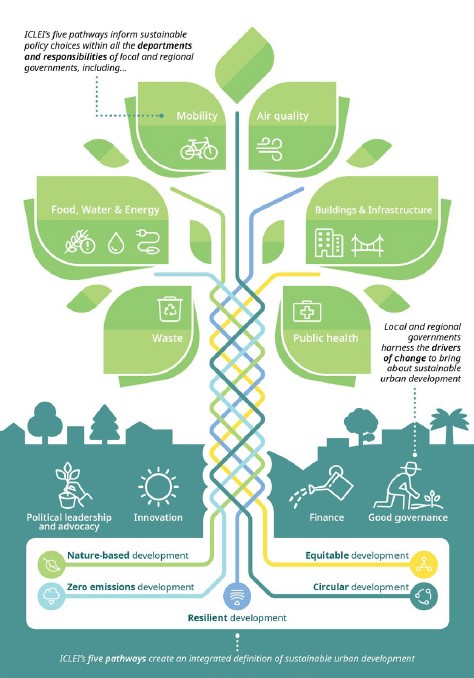Our approach
Sustainable urban development is the key to a more sustainable world.

Our pathways, our approach
ICLEI engages at the local to global levels, shaping policy and sparking action to transform urban environments worldwide. We build connections across levels of government, sectors and stakeholder groups, sparking city-to-city, city-to-region, local-to-global and local-to-national connections. By linking subnational, national and global actors, policies, commitments and initiatives, ICLEI strengthens action at all levels, in support of sustainable urban development.
At the subnational level, ICLEI drives change along five interconnected pathways that cut across sectors and jurisdictional boundaries. This design enables local and regional governments to develop solutions in a holistic and integrated way, creating change across entire urban systems.
These pathways, outlined below, are part of the ICLEI São Paulo Strategic Vision 2024 – 2030, which guides the work of the ICLEI network. The pathways were originally released as part of the ICLEI Montréal Commitment and Strategic Vision 2018-2024.
You can read more about the ICLEI São Paulo Strategic Vision 2024 – 2030 in The Power of Our Network in a Changing World.

The ICLEI São Paulo Strategic Vision 2024 - 2030
Through the ICLEI São Paulo Strategic Vision 2024 – 2030, local and regional governments of the ICLEI network set a way towards the transformation to sustainable development. This vision, set forth in the voice of our local and regional governments, creates a picture of what is needed for a truly sustainable urban world.
ICLEI is and has always been committed to creating global change through work that starts on the local level. Together, we must demonstrate visionary leadership, lead by example, share our knowledge actively and openly and speak with a united voice. Our São Paulo Strategic Vision 2024 – 2030 is a critical part of that promise.
READ OUR STRATEGYHow the pathways work
Cities are complex systems. The components of urban systems, from food distribution networks and energy grids to transport and greenways, are interconnected and dynamic. Intervening to create change in any one of these components may impact others, creating systemic change. Designing solutions that take these interconnections into account is critical to sustainable development.
The five ICLEI pathways towards zero emission, nature-based, equitable, resilient and circular development are designed to create systemic change.
The pathways provide a framework for designing integrated solutions that balance the patterns of human life and the built and natural environments. They encourage holistic thinking to ensure that ICLEI, as a network of local and regional governments and global experts, optimizes our impact. For instance, we consider how nature-based development contributes to resilience, or how to bring equity into low emission development. When these pathways guide local and regional development, urban systems become more sustainable.
Local and regional governments use these pathways as a guide for sustainable urban development through systemic change. Often, our activities are guided by a predominant pathway or set of pathways. In any given city or region, multiple activities may be implemented along each pathway. These activities help local and regional governments advance sustainable urban development.
Urban systems are part of a broader city-region territory. Local and regional governments and their urban systems are interconnected. We address city-to-city and rural-urban linkages to create a multiplier effect. Our network of more than 2500 local and regional governments drives sustainable urban development worldwide.
ICLEI's five pathways toward sustainable urban development
Join our efforts to build a sustainable urban future
Become part of our global network advancing along these five interconnected pathways.
Join us now
